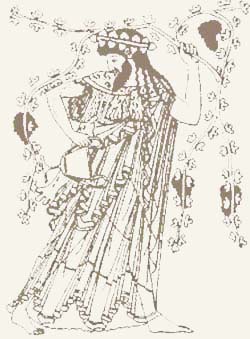The Grapevine Art & Soul Salon
Musings on Being and Becoming Human

Issue 10: Spring into Summer 2008
The Quick and the Dead
Our habit here is to collect stories, articles, essays, poems, quotations, and images during one season (sometimes two) and present them in the next. So an issue that began in spring, when the earth was quickening into new life, appears to you in autumn, when that busy plant and floral life is dying back to decompose over winter and nourish the next generation. The cycle offers profound food for thought, as can be seen in the elaborate metaphorical use humans make of birth and death. In this issue we look at various ways of considering the quick and the dead.
For example, here is D. H. Lawrence writing about our theme (The Novel, 1925, in Selected Critical Writings, Oxford Classics, 1998, l83):
We have to choose between the quick and the dead. The quick is God-flame, in everything. And the dead is dead. In this room where I write, there is a little table that is dead: it doesn't even weakly exist. And there is a ridiculous little iron stove, which for some unknown reason is quick. And there is an iron wardrobe trunk, which for some more mysterious reason is quick. And there are several books, whose mere corpus is dead, utterly dead and non-existent. And there is a sleeping cat, very quick. And a glass lamp that, alas, is dead.
What makes the difference? Quien sabe! But difference there is. And I know it.
... And if one tries to find out, wherein the quickness of the quick lies, it is in a certain weird relationship between that which is quick and--I don't know; perhaps all the rest of things. It seems to consist in an odd sort of fluid, changing, grotesque or beautiful relatedness. That silly iron stove somehow belongs. Whereas this thin-shanked table doesn't belong. It is a mere disconnected lump, like a cut-off finger.
The piece I left out where you see ellipses is this:
And the sum and source of all quickness, we will call God. And the sum and total of all deadness we may call human.
For Lawrence, the human without the God-flame is ordinary. And in Lawrence's view, what is ordinary, what fails or falls away from the flame of vivid life, is dead. I recall hearing poet James Dickey say in a workshop, "D. H. Lawrence taught us how not to be a dead person walking around." I agree that the thrust of Lawrence's writing is always thematically attuned to distinguishing between and choosing between the quick and the dead.
I invite you to explore this topic both by reading and looking at what we have collected for this issue and by conducting your own assessment of the things in your immediate environment. Which ones are quick? Which ones dead? What do you want to do about that? Perhaps nothing. But I'll bet you will see your things with new eyes.
AT HOME here are writers speaking in a style more conversational than studied for an audience who might be seated on a front porch at night watching fireflies create random small rays to light up the listening, or in the dining room of an ancient inn with lamps and perhaps a hearth fire to kindle community.
It takes only one or two steps of the imagination to move through the dusk to the dining room at the inn or the porch of a house or, by daylight, to a backyard garden for picking grapes and for gossiping, a verbal mode associated with the term grapevine. We say I heard it on the grapevine, referring to rumor, advance news of interest to the community, sometimes scandal, always a dramatic story or piece of a story, circulating, making the rounds, lingering on the surface even when it suggests hidden things.
The SALON presents a variety of storytellers and image makers and thinkers, from promising beginners to seasoned artists of mature and full-bodied talents.
The Grapevine Art & Soul Salon welcomes comments from visitors. Use the Contact button to send e-mails that will be forwarded to appropriate persons. If your computer is not configured for Outlook Express, simply copy and paste the webmaster's address into your e-mail system.
Opinions expressed on this site are the opinions of the authors themselves, not necessarily of The Grapevine Art & Soul Salon. Each page on this website should be read in conjunction with this disclaimer.
Image Design: Bill Kennedy
Contributing Writers: Jonathan Knott, Ravi Kumar, Bill Kennedy, Nancy Law, Anne Lovett, Charles Knott, Anne Webster
Copyright ©2008 Barbara Knott ·